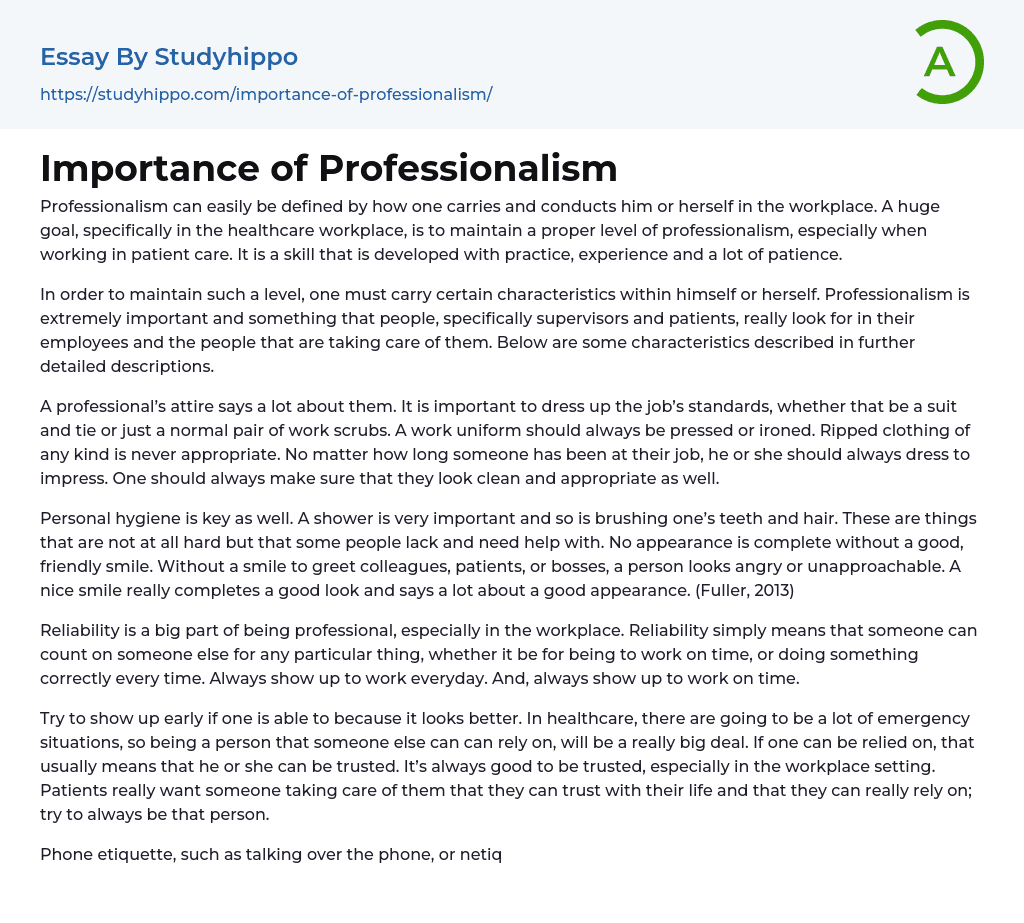Exhibiting professionalism in the workplace, specifically in healthcare, is shown through behavior and demeanor. Achieving a strong level of professionalism, particularly when dealing with patients, is an important goal. This proficiency is developed through repetition, hands-on involvement, and a substantial amount of tolerance.
Maintaining a certain level requires possessing certain characteristics. Professionalism is of utmost importance and is highly valued by supervisors and patients when it comes to those who provide care for them. The following characteristics are described in more detail, with emphasis on the significance of a professional's attire.
It is crucial to adhere to the job's dress code, whether that entails wearing a suit and tie or simply work scrubs. The work attire must always be properly pressed or ironed, and any torn clothing is unsuitable. Regardless of the duration of employment, it is essential to always ai
...m for a polished appearance. Additionally, maintaining cleanliness and appropriateness in personal hygiene is also imperative.
A shower, brushing teeth, and hair care are essential daily activities. While they may seem simple, some individuals require assistance with them. A friendly smile is crucial for a complete appearance. It is necessary to greet colleagues, patients, or bosses without appearing angry or unapproachable. A pleasant smile truly enhances one's overall appearance and conveys a positive impression.
(Fuller, 2013) Reliability is a crucial aspect of professionalism, particularly in the workplace. It implies that one can depend on another person for various tasks, such as arriving punctually and consistently performing tasks accurately. Hence, it is essential to consistently attend work daily and arrive promptly.
Try to arrive early if possible because it creates a positive impression. In healthcare, there will be numerou
emergency situations, so being a dependable individual is crucial. If you can be relied upon, it typically indicates that you are trustworthy. Establishing trust is highly valuable, particularly in a work environment. Patients truly desire a caregiver they can trust with their life and depend on; strive to consistently embody that role.
Phone etiquette, also referred to as netiquette or network etiquette, is becoming more and more crucial in today's society that heavily relies on technology. Email has taken over as the main method of communication in the workplace. However, it is important to understand that without visual cues, it is simple to misinterpret the intended message of a phone call, text message, or email. It is vital to keep in mind that emails hold legal weight and should always be handled with professionalism. One behavior that must be avoided at all costs is "flaming," which involves typing in all capital letters.
When using email, it is important to avoid abbreviations and use full words. Additionally, it is advisable to minimize the use of conjunctions and opt for shorter sentences that are concise and direct. According to Fuller (2013), accountability refers to taking responsibility for one's actions, particularly in a professional context. Demonstrating accountability in a professional workplace is crucial. By accepting accountability for mistakes or wrongdoings, individuals can leave a significant impression on their supervisors or managers.
Showing the supervisor that one is sincere and truly values the job demonstrates seriousness. Delegation involves transferring one's tasks or job responsibilities to another person, with both the delegator and delegatee being accountable. An accountable individual is someone who others prefer to work with, as they do not shift blame
onto others and willingly accept it themselves. Communication is likely the most vital aspect of professionalism.
Communication can be categorized into verbal and nonverbal forms. Verbal communication involves writing or speaking, which is particularly important in patient care as patients seek to feel heard and well cared for. Patients genuinely want to comprehend their condition, making clear and understandable speech essential. The tone of voice used in communication also holds significance.
According to Fuller (2013), nonverbal communication, which is commonly referred to as body language, can provide insight into a person's genuine emotions and degree of involvement when conversing. This encompasses gestures, posture, and facial expressions, all of which serve as significant indicators of an individual's sentiments towards their environment.
Regardless of the thoughts occurring in one's mind, the body language will communicate the true feelings to the recipient. If someone rolls their eyes, it typically indicates irritation or boredom with the current situation and a desire to be elsewhere. Competence entails being capable of performing tasks effectively and achieving success. Efficiency plays a crucial role in the healthcare industry, as it is a fast-paced setting where tasks must be completed swiftly.
Efficiency is crucial in the workplace as it determines one's position on the totem pole and the level of recognition received. Supervisors prioritize competency when evaluating their employees, promoting those who demonstrate competence to higher positions.
(CareerBliss, 2011) Unprofessionalism can have a detrimental effect on the workplace environment, causing discomfort and affecting those around the individual. Conversely, when all individuals exhibit professionalism by adhering to appropriate attire, effective communication skills, accountability for their actions, reliability, and teamwork; it fosters a positive and productive professional atmosphere. The implementation of
clear rules and regulations in the workplace helps establish expectations for employees and minimizes any confusion or uncertainty.
The understanding and expectation of proper conduct is crucial. Professionalism must be upheld to ensure a smoothly functioning workplace, as the actions of one individual can impact the entire environment. This disruption upsets the balance within the organization. It is essential to exhibit dependability, responsibility, punctuality, and above all else, maintain professionalism.
Bibliography
- CareerBliss. (2011, December 13). Business Insider. Retrieved from Businessinsider.com: https://www.businessinsider.com/be-perceived-as-competent-in-the-workplace-2011-12
- Fuller, J. K.
(2013). Surgical Technology Principles and Practice 6th ed. Macon, Georgia: Elsevier.
Professionalism is a crucial career skill (Careerbuilder.com).




